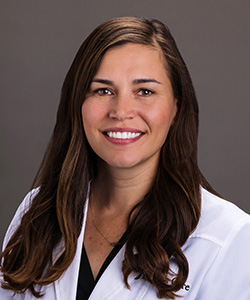April 23, 2025

Families pass down many things, including traditions, special-occasion dishes and eye color. But if your family passes down a health history that includes heart issues, you can inherit a higher risk for cardiovascular disease. Knowing your family history, making informed decisions and taking preventive action can offset that risk.
“We can’t change the genes we are born with,” says Mary Beth Fisher, DO, an MU Health Care cardiologist. “But we can control the environment where those genes exist. Knowing there’s a cause for concern can guide your lifestyle choices and prompt you to be proactive about protecting your heart.”
Dr. Fisher shares what you need to know to navigate your family’s heart health history and its effect on you:
What Is Considered a Family History of Heart Disease?
The impact of your family’s health history depends on the disease. For cardiovascular disease, the heart health of your first-degree relatives — parents, siblings and children — is critical. If they have heart conditions, their age at diagnosis or when they experienced an adverse event also plays a role.

“The biggest concern is having a first-degree relative who had a major cardiovascular event, such as a stroke or heart attack, before age 55 (for males) or 65 (for females),” Dr. Fisher says. Adverse events at a young age may suggest a hereditary syndrome, such as familial hypercholesterolemia (inherited high cholesterol). “There are certain genetic risk factors we can look for, but many genes haven’t been identified yet. So, any time we know a first-degree relative had a major event prior to that age cutoff, it raises a red flag.”
Major adverse events aren’t the only signs to look for. Having a family member with traditional risk factors, such as high blood pressure and high cholesterol, can also affect your risk. Take note if a first-degree relative has a health history that includes:
- Abnormal heart structures, such as an atypical mitral valve or bicuspid aortic valve
- Adverse pregnancy events, such as preeclampsia (high blood pressure during pregnancy)
- Atrial fibrillation (AFib), an irregular heartbeat
- Cardiomyopathy, a weakened heart muscle
- Early menopause, which increases traditional risk factors at a younger age
- High blood pressure at a young age requiring medication management
Don’t just look at the family that came before you. Having a child with a congenital heart condition can also affect your risk of heart disease.
“You can carry the same genotypic mutation (gene change) but not show signs of the disease,” Dr. Fisher says. “Your doctor can let you know if you and your immediate family should take action or get screened.”
How Can a Family History of Cardiovascular Disease Affect You?
The impact of your family history varies depending on how many family members have heart disease, the age at diagnosis and the specifics of their heart issues. But in general, Dr. Fisher says early family history of heart disease can translate to a 30% increased risk.
Having a family history of cardiac issues becomes especially critical in specific situations, such as:
If You’ve Had an Adverse Cardiovascular Event
If you have personally had a cardiac event, a family history of heart disease makes it more likely that you’ll have another one. When you and a first-degree relative have early cardiac events, you are 22% more likely to have a recurrence than someone who does not have that family history.
“It’s critical that your provider knows about your family health history, especially if you’ve had a cardiac event,” Dr. Fisher says. “They need to understand that your risk of recurrence is elevated so they can guide you appropriately.”
If You Are Thinking of Becoming Pregnant
Preeclampsia is considered an early cardiac event. The genetics of preeclampsia are not entirely understood, but if your mom or sister had it during their pregnancy, your risk of developing it goes up.
“Developing preeclampsia affects your risk for cardiovascular disease,” Dr. Fisher says. According to the Preeclampsia Foundation, preeclampsia doubles your risk of heart disease and stroke and makes you four times more likely to have high blood pressure later in life. “Talk to your doctor about your family history before becoming pregnant so you’ll have the appropriate cardiac care in place.”
As You Enter Menopause
Menopause causes a loss of estrogen that increases your risk of cardiovascular issues. It’s especially concerning if you also have a family history of heart disease. After menopause, it’s common to see an uptick in blood pressure, abdominal weight gain and risk for metabolic disorder — a condition that disrupts the body’s ability to process nutrients.
“If you or a family member goes through menopause early, cardiovascular risk increases earlier,” Dr. Fisher says. “Make sure to discuss that with your provider.”
Take Action to Help Prevent Heart Disease
Your primary care provider or cardiologist can give you specific recommendations for staying heart healthy. But Dr. Fisher says there are three steps everyone can take to lower their risk of cardiovascular disease:
1. Learn Your Family History
Talk to your family members about their health history, even if it’s an uncomfortable topic to discuss.
“You share a bloodline, and their health really does influence yours,” Dr. Fisher says.
Gather information about your parents’ and siblings’ current heart health by asking questions, such as:
- Are you on any medications for cardiovascular conditions?
- When were you diagnosed, and when did you start medication?
- Has the medication helped you maintain your goal?
The heart health history of more distant relatives, such as grandparents, aunts and uncles, is relevant and important to know, but it doesn’t translate into the same risk posed by a first-degree relative.
2. Evaluate Your Heart Health
While you can’t control your family’s health or the genes you inherited, you can influence your risk. But first, you need to understand your current heart health.
Screening programs, such as MU Health Care’s Love Your Heart Cardiac Screening, provide an easy way to assess your heart health, even if you are asymptomatic. The screening includes a lab test to measure your cholesterol, blood sugar (A1C) and blood pressure. It also involves a low-dose CT scan to screen for atherosclerosis (calcium buildup in your arteries). You don’t need a physician order for the screening, and you’ll get a summary statement that you can share with your doctor afterward.
Dr. Fisher generally recommends the screening for patients 40 and older. “These numbers are critical to understanding your heart health and where it needs to be,” she says.
3. Make Lifestyle Changes
Living a heart-healthy lifestyle is always a good idea. Dr. Fisher recommends starting with two small steps:
- Manage your stress: Stress and depression are risk factors for heart disease. Find ways to decompress and boost your mental health to influence your long-term cardiovascular risk.
- Move more: Record how much daily movement you get for a week. Challenge yourself to get 30 minutes of uninterrupted activity five days a week. If that feels like a lot, work up to it.
“Making too many changes at once can feel overwhelming,” Dr. Fisher says. “Get a clear picture of your current heart health, and your doctor can help you prioritize lifestyle changes.”
Next Steps and Useful Resources
- Want to check for heart issues before they become a problem? Sign up for a Love Your Heart Cardiac Screening.
- Want to discuss more with a cardiologist? Find one today.


